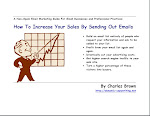One of the first jobs of communicators is to know their audience. The more we can understand about the audience, the more effective our communication will be.
This is why public speakers often conduct some "intelligence" work before giving a speach. I have known some presenters who will ask all kinds of seemingly unnecessary questions about who will be in an audience, what they do, what they all have in common, and what kind of peeves or problems they all face.
One particular speaker I know, who is known for his humorous speeches, will then weave that information into his speech to make his audience roar with laughter.
Writers too can use this same technique to better connect and communicate with readers. The more a writer knows about the audience, the writing can be targeted to that particular readership.
Here are a few questions to ask about your readers the next time you sit down to write for them:
- What things do your readers have in common with each other? Are they in the same profession? Do they work for the same company? Do they live in the same community?
- Is there a common interest or problem that makes them your readers? Will they be reading what you write to solve a particular problem or achieve a certain goal?
- How much prior understanding do they have on your topic? You will lose readers if you write significantly over or under their heads. Advanced readers do not want retread information on a topic they've read about many times before, and novice readers will get lost if your information assumes too much background knowledge.
- Are they looking for condensed information on your topic or are they looking for in-depth analysis?
- Do they share a common vocabulary on the subject?
- What demographic information is available on this readership? (Tip: If you are writing for an established publication that sells advertising, you can count on the fact that it knows what the demographics of its readers are. Just ask.) What is the age range of the readers? Do they mostly live in one geographical area? Do they have a common education level?
COPYRIGHT © 2007, Charles Brown

Labels: marketing research



Hey that's a pretty interesting similarity between speakers and writers. Interesting observation Charles.
annucool15 said...
4:14 AM
Great advice. I'll use them all.
I'm going freelance (on the side) after writing copy for my boss for a long time.
I'm also giving myself over-the-counter Internet knowledge (something I lack)-- James Brausch's useful tools. He has, for instance, a gadget which can evaluate (!) the impact on the audience of different arrangements of text.
Anonymous said...
5:47 PM
Great food for thought in your post. As an aspiring internet marketer copywriting is important to me.
As an entry level marketer I don't have a budget to farm out my copy, I have to learn to do it myself.
I am always looking for something to make it easier. I have looked at software and one that seems to make sense is something called Glyphius. It is interesting that the previous poster mentions James Brausch, because Glyphius is his program.
The reason this one makes sense to me versus so many others that are out there is this one is based on a statistical analysis against a very large database of copy.
Instead of writing the copy for you like all the other software tries to do , this just scores your copy against the database. Then it becomes like a game, making changes and trying to beat your last score.
But in light of your post, knowing the audience, assuming every online sales letter is not targeting the same audience, how could software like that work. It does not know the audience you are selling to, it only knows it's database.
Any thoughts?
Again, very useful information for me in this post. Thanks,
-Scott
Scott Siegel said...
1:54 AM